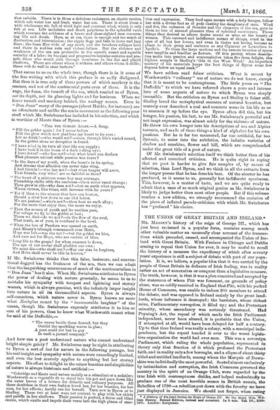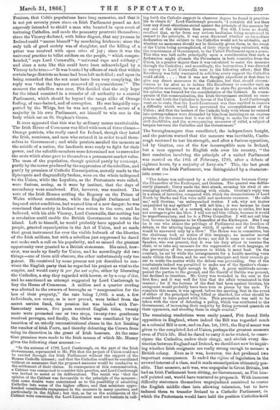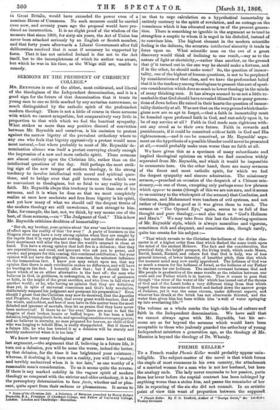THE UNION OF GREAT BRITAIN AND IRELAND.* MR. MASSEY'S history
of the reign of George III., which has just been re-issued in a popular form, contains among much other valuable matter an unusually clear account of the transac- tions which preceded, caused, and accompanied the Union of Ire- land with Great Britain. With Fenians in Chicago and Dublin arming to repeal that Union for ever, it may be useful to recall the history of a measure the expediency of which after seventy years' experience is still a subject of debate with part of our popu- lation. It is, we believe, a popular idea that it was carried by the people of Great Britain in defiance of Irish feeling, was in reality rather an act of annexation or conquest than a legislative measure. The truth, however, is that it was a plan conceived and accepted by the statesmen of whom Pitt was foremost, on grounds of policy alone, was so coldly received in England that Pitt, with his packed House of Commons, was unable to induce 200 .members to attend
• the debate, and was opposed in Ireland mainly by the great land- lords, whose influence it destroyed ; the barristers, whose richest mine, Parliamentary corruption, it filled up ; and the Protestant minority, whose ascendancy was seriously threatened. Had Poyning's Act, the repeal of which made the Irish Parliament independent, never been altered, it is probable that the Union, if attempted at all, would have been delayed for half a century. Up to that time Ireland was really a colony, with a municipal inde- pendence, but the repeal handed it over to the worst legisla- tive organization the world had ever seen. This was a sovereign Parliament, which ruling the whole population, represented in theory only that fraction of it which professed the Protestant faith, and in reality only a few boroughs, and a clique of about thirty titled and untitled landlords, among whom the Marquis of Down- shire was individuallythe most powerful. Seated almost exclusively by intimidation and corruption, the Irish Commons governed the country in the spirit of an Orange Club, were regarded by the true Irish with contemptuous dislike, and helped undoubtedly to produce one of the most horrible scenes in British annals, the Rebellion of 1798—a rebellion put down with the ferocity we have just displayed in Jamaica. We should not forget, when rating
• A Lliotory of En,land during the Reign of George Hr. By the Itiwht lion. Wil- liam Massey. Second Edition, revised and corrected. Is 4 Tele. Vet IV, /M.. 1801. Loudon: Longtnans.
Fenian, that Celtic populations have long memories, and that it is not yet seventy years since an Irish Parliament passed an Act expressly intended to shield a man who boasted in open court of
torturing Catholics, and made the peasantry prostrate themselves ; since the Viceroy declared, with bitter disgust, that any yeoman in Ireland could "amuse himself" by murdering Irishmen; since the
only talk of good society was of slaughter, and the killing of a priest was received with open cries of joy ; since it was the universal practice to billet soldiers on the people, " which compre- hended," says Lord Cornwallis, "universal rape and robbery;" and since a note like this could have been acknowledged by a Viceroy to bo true It was boasted by officers of rank that within certain large districts no home had been left undefiled ; and upon its being remarked that the sex must have been very complying, the reply was ' that the bayonet removed all squeamishness." The moment the rebellion was over, Pitt decided that the only hope for the island consisted in a transfer of all authority to a central Parliament, which should be beyond the range alike of Orange feeling, of race-hatred, and of corruption. He was languidly sup- ported by the Whigs, but he was not opposed, and secure of a majority in his own Parliament, set himself to win one in the body which sat on St. Stephen's Green.
It soon appeared that this was by ordinary means unattainable. The Irish House of Commons was filled with men of three classes— Orange patriots, who really cared for Ireland, though they hated the Irish, nominees, and men who entered, it in order to sell them- selves to Government ; and while patriots assailed the measure as the suicide of a nation, the landlords were ready to fight for their power, and the saleable members were determined not to surrender the seats which alone gave to themselves a permanent market value. The mass of the population, though quieted partly by contempt, partly by the terror produced by the suppression of the rebellion, and partly by promises of Catholic Emancipation, secretly made to the Episcopate and disgracefully broken, were on the whole indisposed to the Union, while the Loyalists, as the Protestants were called, were furious, seeing, as it were by instinct, that the days of ascendancy were numbered. Pitt, however, was resolved. The vote of the Irish Houses settling the Regency on the Prince of Wales without restrictions, while the English Parliament had imposed strict conditions, had warned him of a new danger; he was -convinced that society in Ireland was rotten to the core, and he believed, with bis able Viceroy, Lord Cornwallis, that nothing but a revolution could enable the British Government to retain the island. Left to himself, he would probably have appealed to the people, granted emancipation in the Act of Union, and so made that great instrument for ever the visible bulwark of the liberties of the Irish millions, but with a rebellion just suppressed he dared not make such a call on his popularity, and so missed the greatest opportunity ever granted to a British statesman. His mind, how- ever, was made up finally for Union, and he accordingly did two things—one of them still obscure, the other unfortunately only too patent. He contrived by sonic process not yet described to con- vince the English party that he regarded his project as vital to the
empire, and would carry it per far aut nefas, either by liberating the Catholics, a step they regarded with horror, or by a coup d'elat,
and he sanctioned an attempt suggested by Lord Castlereagh to buy the House of Commons. A million and a quarter sterling was allotted to the owners of boroughs as " compensation for the loss of their property," the rate . being 7,0001. a seat, a few individuals, not many, as is now proved, were bribed from the secret service fund, the pension list was loaded with Par- liamentary names, five peers received English titles, twenty more were promoted one or two steps, twenty-two gentlemen received peerages, and finally, the. Order was conciliated by the insertion of an utterly unconstitutional clause in the Act limiting the number of Irish Peers, and thereby debarring the Crown from using its discretion in the grant of Irish honours. At the same time promises were made to the Irish masses of which Mr. Massey gives the following clear amount
"In the autumn of 1799, Lord Castlereagh, on the part of the Irish Government, represented to Mr. Pitt that the project of Union could not be carried through the Irish Parliament without the support of the Roman Catholic interest ; and that the. Catholics could not be conciliated without an asauxanoe that the proposed measure would be conducive to the settlement of their claims. In consequence of this communication, a Cabinet was summoned to consider this question, and Lord Castlereagh was invited to assist at its deliberations. The result was 'that the opinion of the Cabinet was favourable to the principle of the measure ; that some doubts were entertained as to the possibility of admitting Catholics into some of the higher offices; and that ministers appre- hended considerable repugnance to the measure in many quarters, and particularly in the highest ; but that, as far as the sentiments of the Cabinet were concerned, the Lord-Lieutenant need not hesitate in call- ing forth the Catholic support in whatever degree ho found it practica- ble to obtain it.' Lord Castlereagh proceeds, ' I certainly did not then hear any direst objections stated against the prinoiple of the measure by any one of the ministers then present. You will, I have no doubt, recollect that, so far from any serious hesitation being entertained in respect to tho principle, it was even discussed whether an immediate declaration on the subject to the Catholics would not be advisable, ant whether an assurance should not be distinctly given them, in the event of the Union being accomplished, of their objects being submitted, with the countenance of Government, to the United Parliament upon a peace. This idea was laid aside principally upon a consideration that such a declaration might alienate the Protestants in both countries from the Union, in a greater degree than it was calculated to assist the measure through the Catholics ; and accordingly, the instructions I was directed to convoy to Lord Cornwallis were to the following effect ; that His Excellency was fully warranted in soliciting every support the Catholics could afford. . . . . that it was not thought expedient at that time to give any direct assurance to the Catholics, but that, should circum- stances so far alter as to induce His Excellency to consider such an explanation necessary, he was at liberty to state the grounds on which his opinion was formed for the consideration of the Cabinet. In conse- quence of this oonanutuiestion, the Irish Government omitted no exer- tion to call forth the Catholics in favour of the Union. Lord Castlereagh went on to state, that the Lord-Lieutenant was thus enabled to remove a diffioulty which would have prevented the accomplishment of the Union ; and that the leaders of the Catholic body with whom he entered into correspondence were dissuaded by him from insisting on an express promise, for the reason that it was not fitting to make the rem wet of civil disabilities, and the accompanying measures of relief, a subject of bargain between the Catholics and the Government."
The borougbmongers thus conciliated, the independents bought, and the patriots warned that the measure was inevitable, Castle- reagh ventured to test his strength, and after a furious opposition, led by Grattan, one of the few incorruptible men in Ireland, but a man opposed to English rule over his country, "the first resolution involving the principle of a united Parliament was carried on the 18th of February, 1789, after a debate of eighteen hours, by a majority of forty-six." This, the last great debate of the Irish Parliament, was distinguished by a character- istic scene :— "The debate was enlivened by a violent altercation between Corry the Chancellor of the Exchequer, and Grattan. The quarrel was delibe- rately planned ; Corry made the first attack, accusing his rival of en- couraging rebellion, and associating with rebels. Grattan's reply was in a strain of invective, compared with which the denunciations of Lord North by Burke and Fox were mild and moderate censures: He calls me,' said Grattan, 'an =impeached traitor. I ask, why not traitor unqualified by any epithet? I will tell him ; it was because he dare not. It was the act of a coward, who raises his arm to strike, but has not courage to give the blow. I will not call him villain, because it would be =parliamentary; and he is a Privy Councillor. I will not call him fool, because he happens to be Chancellor of the Exchequer. But I say he is one who abuses the privilege of Parliament and the freedom of debate, to the uttering language which, if spoken out of the House, would be answered only by a blow.' The House was in committee, but the chairman took no notice of this language ; no member moved that the words should be taken down ; nor did it seem to occur to the Speaker, who was present, that it was his duty either to resume the chair, or to take any measure for the suppression of such language, or the prevention of the consequences to which it must lead. On the contrary, he sat by while the arrangements for a hostile meeting were made within the Hone, and he saw the principals and their seconds go out to settle the matter while the debate was proceeding. One of the combatants indeed was permitted to make use of the Speaker's cham- ber, until there was light enough to fight. A great multitude accom- panied the parties to the ground, and the Sheriff of Dublin was present, but declined to interfere. Mr. Corry was wounded• in the arm at the first fire ; and it was well for him that the affair terminated in this manner ; for if the fortune of the duel had been against Grattan, his antagonist would probably have been torn to pieces by the mob. To complete this scene, it was agreed, before the meeting, that in the event of either of the principals being killed or disabled, the other should be considered to have paired with him. This precaution was said to be taken with the view of defeating a policy, which was attributed to the Government, of increasing their majority by fixing personal quarrels on their opponents, and shooting them in single combat."
The remaining resolutions were easily passed, Pitt found little opposition in England, where indeed the Bill was regarded much as a colonial Bill is now, and on Jan. 1st, 1801, the Royal assent was given to the completed Act of Union, perhaps the greatest measure even of Pitt's life. Had he dared to carry it as he wished, to eman- cipate the Catholics, endow their clergy, and abolish every dis- tinction between England and Ireland, we should not now be au:pair- ing whether Irish emigrants are really strong enough to menace a British colony. Even as it was, however, the Act produced two important consequences. It ended the regime of legislation in the avowed interest of a class, audit made emancipation ultimately pos- sible. That measure, as it was, was unpopular in Great Britain, but had an Irish Parliament been sitting, no Government, as Pitt him- self pointed out, would have ventured to propose it. With immense difficulty statesmen themselves unprejudiced contrived to coerce the English middle class into allowing toleration, but to have induced them to transfer Ireland to a Catholic Parliament, in which the Protestants would have held the position Catholics hold in Great Britain, would have exceeded the power even of a nominee House of Commons. No such measure could be carried even now, and seventy years ago the proposal would have pro- duced an insurrection. It is no slight proof of the wisdom of the measure that since 1800, for sixty-six years, the Act of Union has never been attacked seriously by an English or Scotch member, and that forty years afterwards a Liberal Government after full deliberation resolved that it must if necessary be supported by force. That it has not satisfied Ireland is due not to the Act itself, but to the incompleteness of which its author was aware, but which he was in his time, as the Whigs still are, unable to remedy.
































 Previous page
Previous page